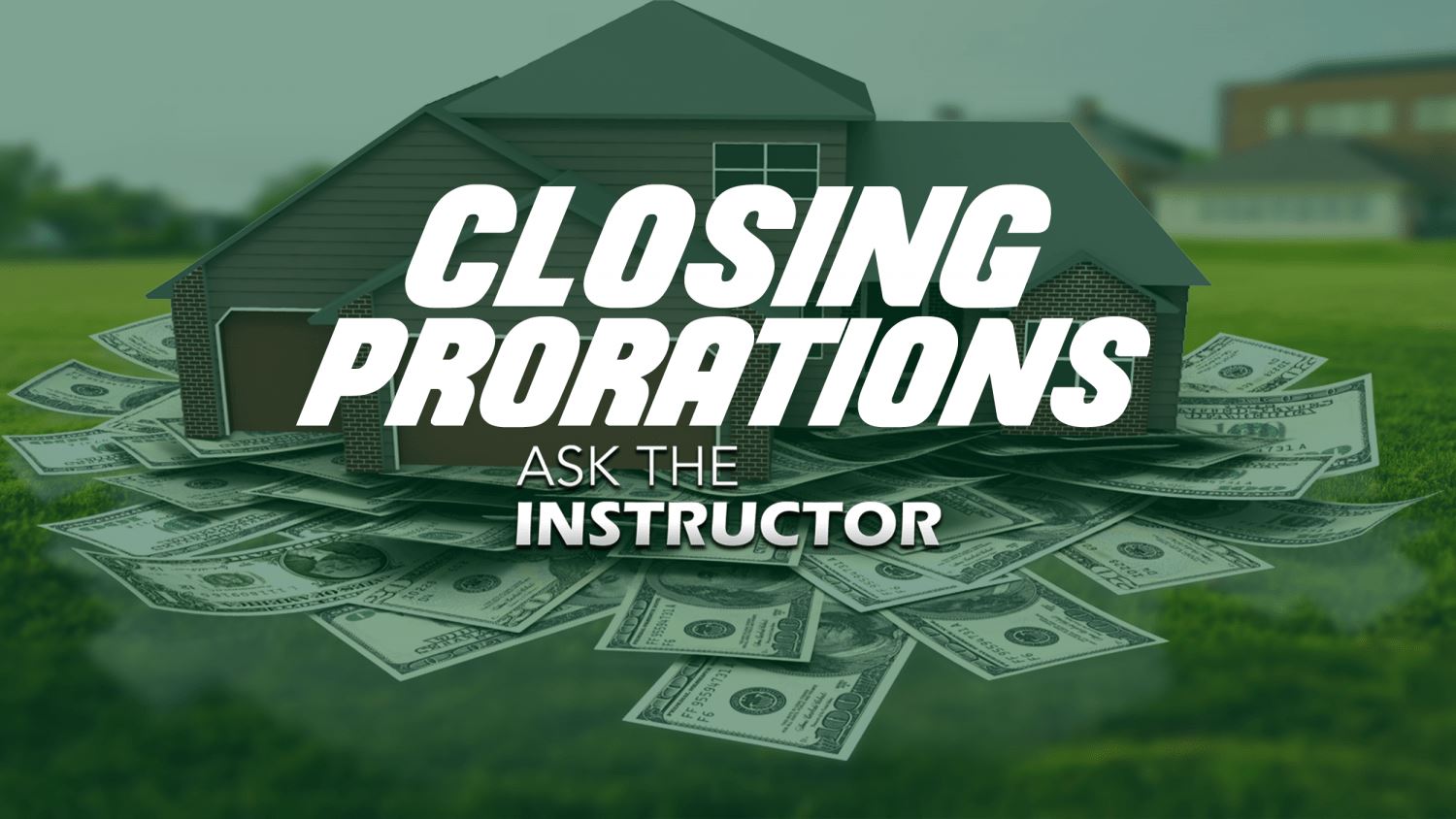Live Every Wednesday at 12 Noon EST
How much money will I earn if I sell this house? Can I make money helping a renter find an apartment? What about commercial real estate?
Answers to these questions and more on this weeks episode of Ask the Instructor! For more exam prep tools or to enroll an a Florida real estate license course visit TampaSchoolofRealEstate.com or call us at (813) 928-0106
You can also watch the live stream on Youtube
This is the blog topic that you might be more interested about. Yeah, who doesn’t want to know how they are getting paid? How can they get paid? And how the calculation works for real estate agent or real estate business revenue? Pretty intriguing to know right?! Those are the things that we are going to discuss in this article which will give you further understanding of the Real Estate Commission which is how real estate agents/real estate businesses get their bread and butter revenue to run their 5.. 6.. 7 figures real estate business. There might be some slight difference from how you can get commission from a Residential and Commercial Transaction which we are going to cover in this article for you! Let’s get started!
First let’s talk on how it works on a residential transaction which makes up the majority of the market share, especially in this market that we have in Tampa right now.
First question that you might be having right now is, “who is going to set the real estate commission for residential sales transactions?”. Fair question to start with because we definitely want to know where to begin. Let’s get to it: To start the Residential Sales Transaction, the rate is being set up by the listing side (seller’s agent) of the property— from the total amount of the property and the % negotiated commission amount by the listing agent and property seller. On the other side of the sales transaction, there will be a buyer side (buyer’s agent) which is mostly separate agents and brokerage from the listing agent, but not all the time which we will discuss later. Mind blowing so far? No worries, I got you. Look at the chart that we have ready for you.


On this figure, this will show how the commission will be if the property is not listed in MLS System and you have successfully secured a buyer from your lists of potential buyers using your expertise alone. Take note, If ever you have a Real Estate Broker that helps you secure this close deal, you will not be getting the 100% commission share, as it will be upon the negotiation that you have from your broker.
Just like that! You now know how the commission works from a real estate agent (listing side or buying side) and broker. As to how the property owner sees these charges on his/her statement. Based on figure 1.1, there will be a debit of $18,000 (commission amount) less from the total appraised property value on his bank account. As for the buying side, there will be no charges due to commission as it will be taken from the property value that was on the market. Buyer side may be charged with a retainer fee or deposit fee, but typically there will be no charges made on the commission side.
Not all of the residential sales transactions are the seller's property where they want to sell their house, there are what we call Residential Rentals. You have the same question again right? How will the rate of the commission work for Rental Property? Is it totally different from Private Property Sale? Allow me to feed you with that information.
Rental Property Landlords ask real estate professionals to market and advertise their rental properties to possible tenants. It is not only about private town houses that the owner wants to get a tenant, but also apartments, flats, and other residential rentals that business owners want to fill in with tenants to make their business grow and scale. With that being said, the commission rates will differ. There are landlords who offer flat rate commission rates which normally range from $50 and as much higher of $5,000—which these commissions are being flagged as application fees to the tenants. These types of offers normally are done by old-fashion well established apartments owners, single family homes that wanted to be rented out. Other landlords or property rental owners offer one-month rent or two-month rent as a commission and this situation happens when they have large scale of open properties that they want to fill in with tenants quickly.
We already covered the Residential Sales Transaction that us real estate professionals can get our commission to. Now, negotiations on % commission can be tough since professional listing agents will fight over the Property Owner’s trust to choose them to list their property and have it placed in the market. A quick way for you to leverage yourself on top of those listing agents is, making sure that your offer doesn’t only end in selling the market and getting your commission out of it. Build an offer to your client—perks of hiring you as their real estate professional (exquisite marketing skills, awesome advertising, bigger list of connections of possible buyers) and establish your ground on how you can close property the quickest way possible with a bit more value from it.
So we are moving on now to getting bigger numbers by talking about Commercial Sales Transaction. These types of transactions don't really fall too far from how the Residential Transaction goes, it just has bigger numbers!
We still have a lovely graph here for you! Just like what I mentioned, numbers are getting longer on this side of Real Estate Sales Transaction and we do have 2 different sides at hand which is the listing side and buyers side. Easy peasy right? You are now getting good with real estate math!
Since you are now getting better with numbers. Let’s talk about calculating Commercial Leases, and how you can get your commission from there as a real estate professional.
For Commercial Leases, this type of market is giving values via; area of sq.ft of the property that they will lease, $ cost per sq.ft, and how many years will the lease last. Getting a bit dizzy? No worries, I got you. Let’s say for example:
1,000 sq.ft = area of the property
$12/sq.ft = cost per sq.ft
10 year = how long is the lease contract
From these details that we have at hand, we first need to know what will be the lessee’s monthly rental fee is—which is by getting the product of the area of the property and cost per sq.ft and divide it by 12 months since that is an annual value (1,000 sq.ft • $12 per sq.ft = $12000/12). That means, the monthly lessee’s rent will be $1,000, and this will be your close dealer offer to your possible lessee! You have that figured out now, then let’s talk about your bread and butter commission and how to calculate it. First, you need to get the total commercial lease price that you are going to present on your contract which is multiplying the number of years from the product of cost per sq.ft of the property area ($12,000sq.ftx10year). The figures will be $120,000.00 contract lease price, and that is where you will get the % commission that you will negotiate with the commercial property leasor, then the same thing will happen again wherein you will have it listed in your MLS which you will be the listing side and manage to get the buyer side which will be the leasee—split with commission will vary depends if you’ve done within one real estate office or you have 2 offices that manage this sides.
Congratulations! Hope this gives you the best knowledge background on how to calculate your commission rate, where you can get your commission rate, and what are the factors that you need to know when calculating your take home commission rate.
This information is brought to you by the Success Center at TSRE | Tampa School of Real Estate.
TSRE was founded upon the idea of being MORE than a required class. When starting a real estate career, there's so much more than just passing a class. At TSRE your success is our success, and one of the ways we're here to help you every step of the way is the TSRE Success Center. Whether you're just starting out or are trying to take your business to the next level, we're here to help you build your real estate empire.







